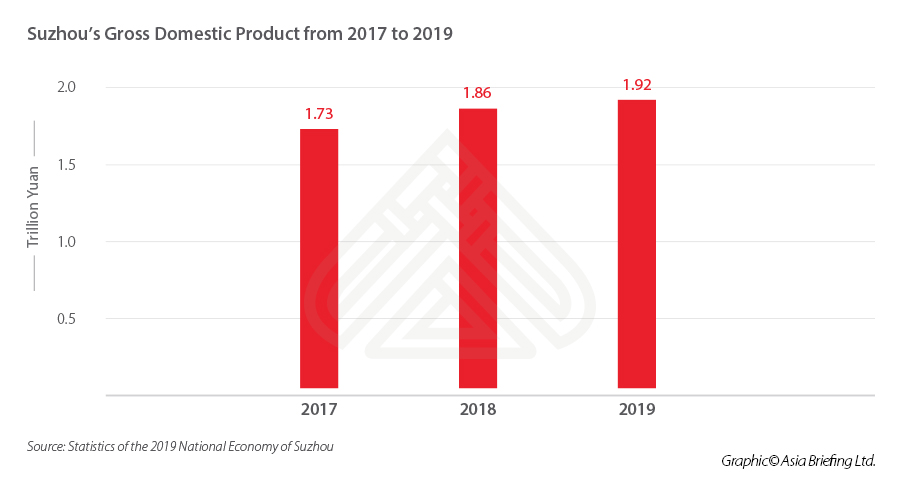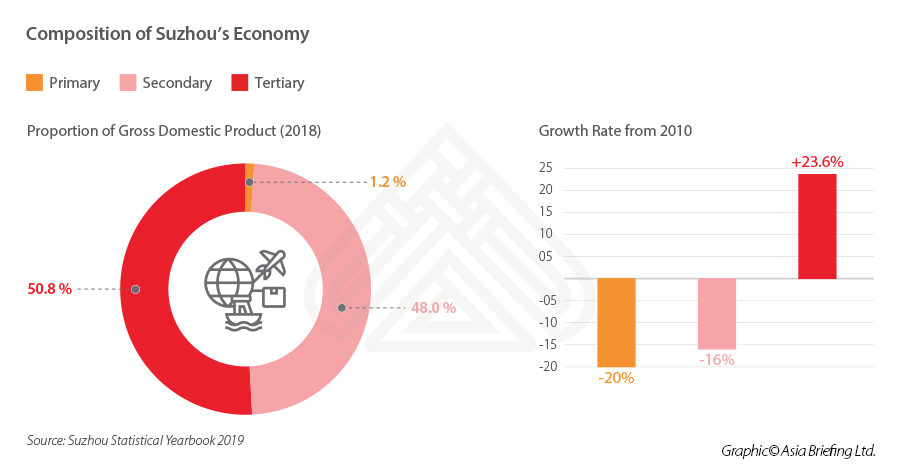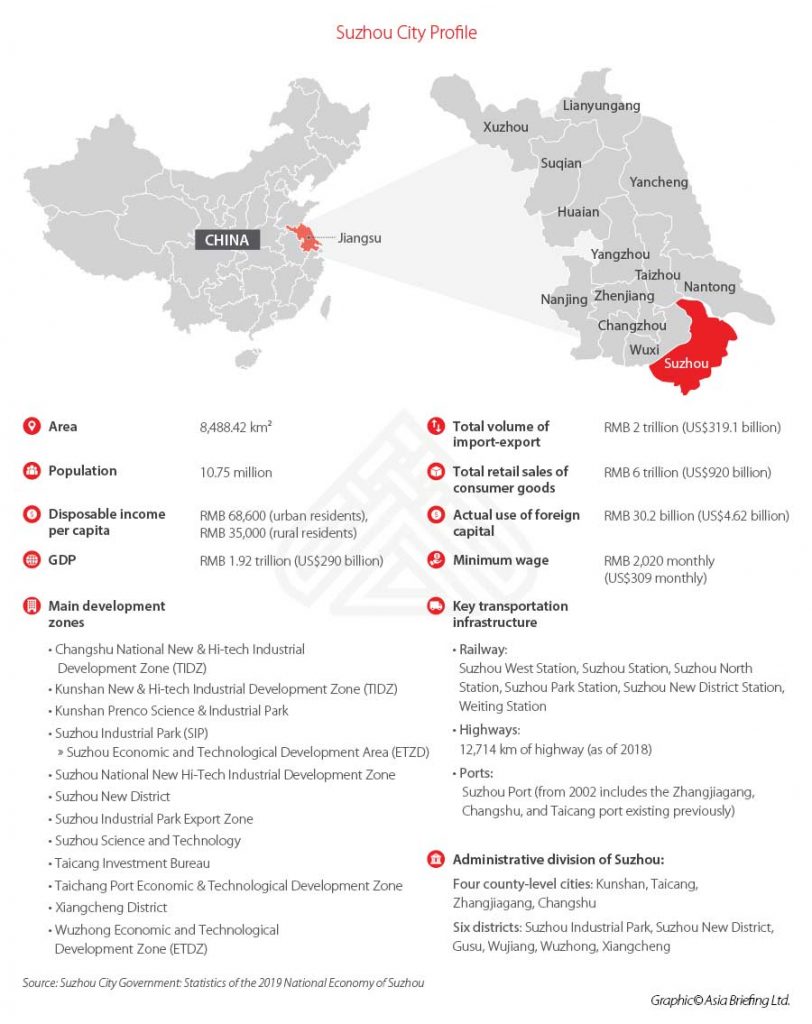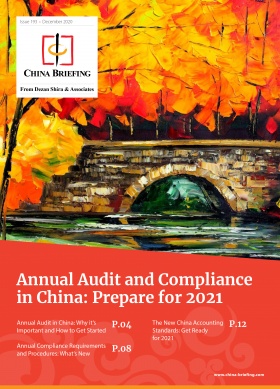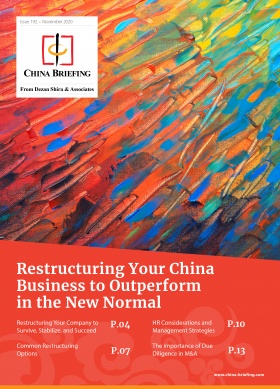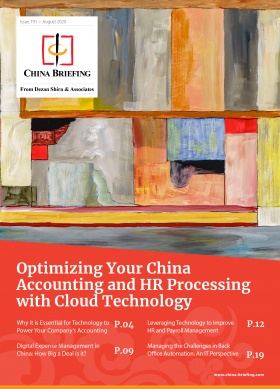Suzhou City Profile: Investment Stronghold and Innovation Trailblazer
Suzhou is a prefecture-level city located in the southwestern province of Jiangsu. Residing on the lower reaches of the Yangtze River, and a 30-min train ride from Shanghai, it a prominent city of the Yangtze River Delta region (YRD) – one of China’s most developed mega city clusters.
Often dubbed the “Venice of the East” – Suzhou boasts a beautiful landscape laden with canals and brimming with a vibrant workforce, which together place the city at the cusp of China’s new drive towards innovation.
Its prime location, low operating costs, and favorable policy environment have transformed the city into a strategic hub for trade, business, and a frontier for foreign investment.
To date, Suzhou has attracted more than 17,000 foreign-funded enterprises, from 115 countries and regions. Together, this has seen an actual use of foreign investment that reached RMB 864.2 billion (US$132.4 billion) by the end of 2019, next only to Shanghai and Beijing.
The city, which is characterized by its large industrial parks, multiple ports, and advanced manufacturing infrastructure is fast becoming a metropolis of successful businesses.
Investing in Suzhou
Dezan Shira & Associates’ Suzhou Team has expanded and moved to a new office in the Suzhou Industrial Park. Our experienced team of HR, accounting, legal, and tax professionals are well placed to provide you practical advice to assist you in making critical investment decisions. For more information, please email us at suzhou@dezshira.com or visit our website at www.dezshira.com
Economic profile
In recent years, Suzhou’s economy has maintained a steady growth. In 2019, the city’s total GDP was RMB 1.92 trillion (US$290 billion), representing a 3.2 percent increase from 2018.
In the first 11 months of 2019, the total value of import-exports to and from the city amounted to RMB 2.1 trillion (US$320 billion) and RMB 1.21 trillion (US190 billion), respectively – accounting for half of the trade in Jiangsu province, and 7.1 percent of the country’s total.
In the same period, registered foreign capital RMB 646 billion (US$99.9 billion) – an increase of 0.7 percent, with the actual utilization of incoming foreign capital increasing by 4.3 percent at RMB 30 billion (US$4.6 billion).
Traditionally, Suzhou specialized in primary industries like iron and steel but over the years, it has become less reliant on raw material (primary industries) and shifted more towards manufacturing (secondary industries) and modern services (tertiary industry).
Manufacturing assumes a large proportion of Suzhou’s GDP – with electronic equipment, automotive, and telecommunications among the dominant industries.
Suzhou’s annual industrial output value is now worth more than RMB 3 trillion (US$460 billion), making it the third largest manufacturing city in the country. Secondary industries while strong, have headed towards the national strategy of ‘green, intelligent, and advanced production’ – much like the trends we see across the country.
The tertiary sector has also seen rapid growth and diversification of its industries in order to meet the rising wealth of the province, as well as match the technological and industrial advancements that are taking place on the national scale.
In line with these trends, we see an acceleration of fast booming modern service sectors, such as research and development (R&D), supply chain management, modern commerce and trade, medical care, educational training, cultural and creative industries, tourism and leisure, and the financial industry.
Due to recent preferential government policies, emerging industries, such as biomedicine, new energy and materials, high-end manufacturing, software service outsourcing, and the Internet of Things (IoT), have also developed rapidly in the region.
Suzhou’s developed transportation networks also make it a good destination for trade – with easy access to key international airports, high speed railways, open ports, and international railways, such as the Suzhou-Manzhouli Europe that enables Suzhou to play a significant role along the Belt and Road.
Suzhou a test bed for innovation and growth
Part of Suzhou’s success story is the city’s key role in piloting national reform measures to be applied in Jiangsu, and others in China more broadly.
One clear example of this is China’s development of its digital yuan (also known as the DCEP). In April 2020, Suzhou was among one of the first cities selected to test the feasibility of the DCEP. This trial initially began in a controlled setting, operating only among civil servants in Xiangcheng District who were to pay half of their transport subsidies in digital currency in May as a test run.
However, in December 2020, Suzhou will be engaged in a much more expansive trial of the DCEP as it prepares to launch 100,000 digital RMB red envelopes in the upcoming Double 12 shopping festival – making Suzhou the second city after Shenzhen to pilot the digital RMB at a city-wide level.
Another example is its push towards constructing pilot zones for various purposes such as: CEPA, upgrading trade processes, service outsourcing, e-commerce, next-generation Internet, electronic social security and so on. This is often done so in specially carved out areas of development zones such as:
- Pilot for Innovative Development of Trade in Services,
- China (Suzhou) Comprehensive Pilot Area for Cross-border E-commerce,
- Suzhou Industrial Park Integrated Trial Area for Promoting Openness and Innovation,
- Kunshan Pilot Area for Deepening Cross-strait Industrial Cooperation and so on.
Foreign investment landscape
Suzhou is a hotbed for foreign investment. The rapid growth of foreign direct investment (FDI) in the city is due in part to its advantageous location, solid industrial base, reasonable production costs, and favorable policy environment.
At the “Conference of Further Opening-Up in Suzhou”, which was held in January 2020 – 30 groundbreaking policy measures for further opening-up were issued. Alongside this, an Infographic Guide to Investment in Suzhou was released for global investors that mapped 230 development platforms and premises with a total area of 68.8 square meters to accommodate new investments and a further 175 investment cooperation opportunities.
The 30 policy measures focus on five aspects:
- Opening to promote technological innovation;
- Promoting industrial transformation;
- Promoting effective investment;
- Promoting environmental optimization; and
- Promoting functional enhancement.
Among the 30 measures include: the “3+3” encouragement policy, which will mean 1,000 innovative companies will be selected on a rolling basis within three years to receive rewards in accordance with the national high-tech enterprise income tax policy.
Suzhou also plays a key role in the Yangtze River Delta Integration Zone – which has been elevated to a national strategy – and since been solidified as a key component of China’s Dual Circulation Strategy. Suzhou’s prime location, convenient transportation, and well-connected logistic services make the city a key part of industrial chains, supporting both upstream and downstream production in the region.
The Yangtze River Delta has seen the release of various new policies that make it easier to do business within this region.
For example on August 21, Shanghai (Qingpu), Suzhou (Wujiang), and Jiaxin’s (Jiashang) issued a list of tax-related matters that can be handled across the three jurisdictions, including matters relating to VAT tax deduction, invoice verification, tax credit rating, and individual income tax.
Separately, on October 14, the same cities jointly issued the Catalogue of Investment Projects Approved by the Government of the Yangtze River Delta Eco-Green Integration Development Demonstration Zone (2020 edition), which aims to reduce the institutional costs and coordination costs of cross-regional investment in areas, such as agriculture, water conservancy, energy, transportation, information industry, raw materials, light industry, new and high technology, urban construction, ecological environment, social undertakings, and foreign investment.
Suzhou Industrial Park
One of the most striking features of Suzhou’s business landscape is the illustrious Suzhou Industrial Park (SIP), which is home to 1.19 million people and recorded a GDP of RMB 274.3 billion (US$42 billion) in 2019.
The SIP is Suzhou’s largest industrial park covering 278 sq km (80 sq km of which is designated to the China-Singapore Cooperative Zone) is also home to many of the government’s unique preferential policies for businesses.
We list some of the types of policies implemented in 2020 within the SIP below:
Incentives for establishing headquarters in SIP
Beginning June 2020, newly established headquarters of enterprises that meet the stipulated requirements are entitled to a whole range of settlement rewards (up to 100 percent of the local economic contribution over the course of five years), business incentives (up to 80 percent of the increase in local economic contribution) and rent subsidies (renting office space will be given not exceeding 50 percent of the actual expenditure within three years).
Top talent can also be granted housing subsidies of up to RMB 5 million, and urgently needed talents who have made outstanding contribution in the headquarter enterprises can be paid at five percent of personal salary (up to a certain amount).
To qualify, at the very least, the total assets of parent companies of the production enterprises must be no less than US$200 million (RMB 1.3 billion) and total assets of no less than US$100 million (US$652 million) must be directly engaged in management or services, such as procurement, R&D, finance, offshore trade settlement, sales, logistics, and information technology etc.
Talent attraction and training policies
Beginning April 2020, employees that fall within one of the stipulated levels of talent are entitled to an array of different incentives, such as entrepreneurship support, housing purchase subsidies, talent HDB housing, access to governmental rental houses, rewards, and salary and postdoctoral subsidies. Other subsidies offered relate to scholarships, headhunting, internships, and headhunting. A further subsidy program was released September 2020 for upskilling employees in enterprises within Suzhou Industrial Park.
Support for the biomedical industry
The Suzhou Industrial Park Management Committee announced more preferential policies for biomedical enterprises operating within SIP, with the aim of bolstering the production of innovative drugs, high-end medical equipment and new biotechnology, and emerging therapies.
Starting June 2, 2020, biomedical enterprises that met the relevant requirements will be entitled to:
- Industrial development fund support (total fund of RMB 10 billion (US$1.5billion) earmarked to support direct investment, M&A etc., and an additional RMB 2 billion (US$310 million) to support leading enterprises and angel investment institutions);
- Rewards for major projects (a certain proportion of the investment will be funded where the investment meets the threshold amount); and,
- Reward for high-tech enterprises (eligible enterprise will be recommended as high-tech enterprises in Suzhou area of FTZ and can apply for rewards with reference to the national high-tech enterprise preferential policies).
Other notable development zones
Some of Suzhou’s other main development zones are mentioned below.
Suzhou Wuzhong Economic Development Zone
Established in 1993, the Suzhou Wuzhong Economic Development Zone (SWEDZ) ranks among the top ten economic development zones in Jiangsu province. Currently, the zone hosts some 6,000 domestic and foreign invested enterprises, featuring industrial clusters in precision machinery manufacturing, electronics and IT, biomedicine, and new energy and new materials.
Suzhou National New & Hi-Tech Industrial Development Zone
This Zone was established in 1990 and is now popularly known as the Suzhou New District (SND). In November 1992, the zone was upgraded to the status of a national-level hi-tech industrial zone. Major industries in the district include information technology, electronics, pharmaceuticals, fine chemicals, and auto parts.
Xiangcheng District
Established in 2012, the Xiangcheng District covers an area of approximately 50 sq km, with the Caohu Industrial Park at its center. The district is located in northern Suzhou and borders the SIP to the southeast and the SND to the southwest. Industry is mainly concentrated in precision machinery, auto parts, energy saving, and green technology.
Suzhou Industrial Park Export Processing Zone
The Suzhou Industrial Park Export Processing Zone, located inside the SIP, was approved by the government in April 2000, with a planned area of 2.9 sq km.
Suzhou offers an attractive global investment climate
Suzhou remains an increasingly popular destination to do business.
By the end of 2019, more than 150 Fortune 500 companies had invested in Suzhou – including international heavyweights, such as Phillips Healthcare, P&G, Bosch, BP, ExxonMobil, Harvard Research Institution, JD.com, Zippo, and Honeywell.
In 2020, this list expanded to include Starbucks, which invested US$300 million (RMB 1.96 trillion) in a coffee innovation park in Suzhou – the coffee giant’s largest productive investment outside of the United states, which is expected to become operational in 2022.
In addition, the city saw new settlements of regional headquarters of multinationals. For example, Japanese office furniture manufacturer ITOKI announced this February that it would establish its China headquarters in Suzhou Xiangcheng Economic and Technology Development Zone.
The urban area of Suzhou covers industrial parks, export processing zones, economic development zones, logistics parks, bonded areas, and research centers, at both national and provincial levels. This offers distinct location and policy advantages for enterprises to establish and scale their businesses from here. Foreign investors wishing to avail the new 2020 policies released in Suzhou can contact suzhou@dezshira.com for more information.
About Us
China Briefing is written and produced by Dezan Shira & Associates. The practice assists foreign investors into China and has done so since 1992 through offices in Beijing, Tianjin, Dalian, Qingdao, Shanghai, Hangzhou, Ningbo, Suzhou, Guangzhou, Dongguan, Zhongshan, Shenzhen, and Hong Kong. Please contact the firm for assistance in China at china@dezshira.com.
We also maintain offices assisting foreign investors in Vietnam, Indonesia, Singapore, The Philippines, Malaysia, Thailand, United States, and Italy, in addition to our practices in India and Russia and our trade research facilities along the Belt & Road Initiative.
- Previous Article China Optimizes Prepayment of Individual Income Tax by Some Taxpayers
- Next Article China’s Personal Information Protection Law: Compliance Considerations from an IT Perspective

